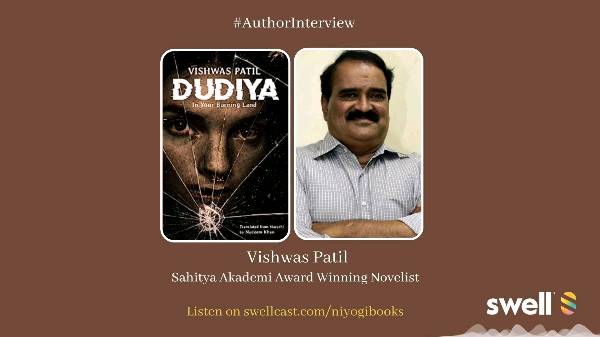
@niyogibooks
Established in 2004, in Delhi, we are an independent publishing house with more than 600 titles—and the list continues to grow.
Sahitya Akademi Award winning Writer Vishwas Patil talks about his novel 'Dudiya: In your Burning Land'.
The novel Dudiya: In your burning land Published by Niyogi Books and written by Sahitya Akademi award winning novelist Shri Vishwas Patil was originally written in Marathi and translated by Professor Nadeem Khan into English. This novel captures the heartbreaking reality of the Naxal menace plaguing present day Chattisgarh and it's a story of a spirited young Adivasi girl who challenges conventional norms both within her tribe and inside the Naxal camp that she becomes a part of
I met the officer like Pravasharmah a living SP who was over 24/7 was talking about raids and counter raids and was going through this burning land. As a writer I felt their emotions. The tragedy of poor girls, her brother like Thakuran the meeting of the brother and sister after the gap of twelve years. They were grown up now they couldn't recognize each other and how they were streamed with eyes. So such kind of incident created a strong influence on me which made it me to write the book
Swell Team
@Swell · 0:15
Vishwasji. I'd like to know a little bit more about your research process for this book. How did you research and immerse yourself in the Naxal dominated area of Chhattisgarh while working on this novel? Were there any particular experiences or incidents that had a profound impact on you during this time?
I researched, made study of Mahindra Karma, their moment of salvadjudum. How they were harassed with the Nakshals and they founded Salvad Judum. The agitation of the Adiwasids poor Adiwasids which was initially a mass movement in reality but later on offering to them the guns by the state government and appointment with special police officers. How they also become tyrant. That story I understood and I checked also. So my visits at various places. Then talking with newspaper men
That's why Nadim Khan has minutely in detail and very nice word has translated the last chapter of my novel. The chasing of government officers by Nakshals and changing of Nakshals by government officer. Their movements, sharp moments, turns and returns in jungle. All that atmosphere has nicely came into English
I think I'll leave you with one final question. But before that, let me thank you for being a part of this conversation and for taking us behind the scenes of the writing of the novel. More power to your words, sir. So my final question is this what impact do you hope the book will have on readers? And are there any specific reactions or emotions that you wish to evoke through your book?
I recollect my all real characters and imaginary characters also today I feel that Nakshalism is a great task before India it is affecting eleven states. It is described as a red giliara, that is a red corridor which is spreading from Pashupati to Tirupati and affecting these eleven states. My research is that even surrendered Nakshals are also not happy. They are also not getting immediate government job or compensation. They remain in queue for many years. Still in Nakshal area many government schemes are under terror

